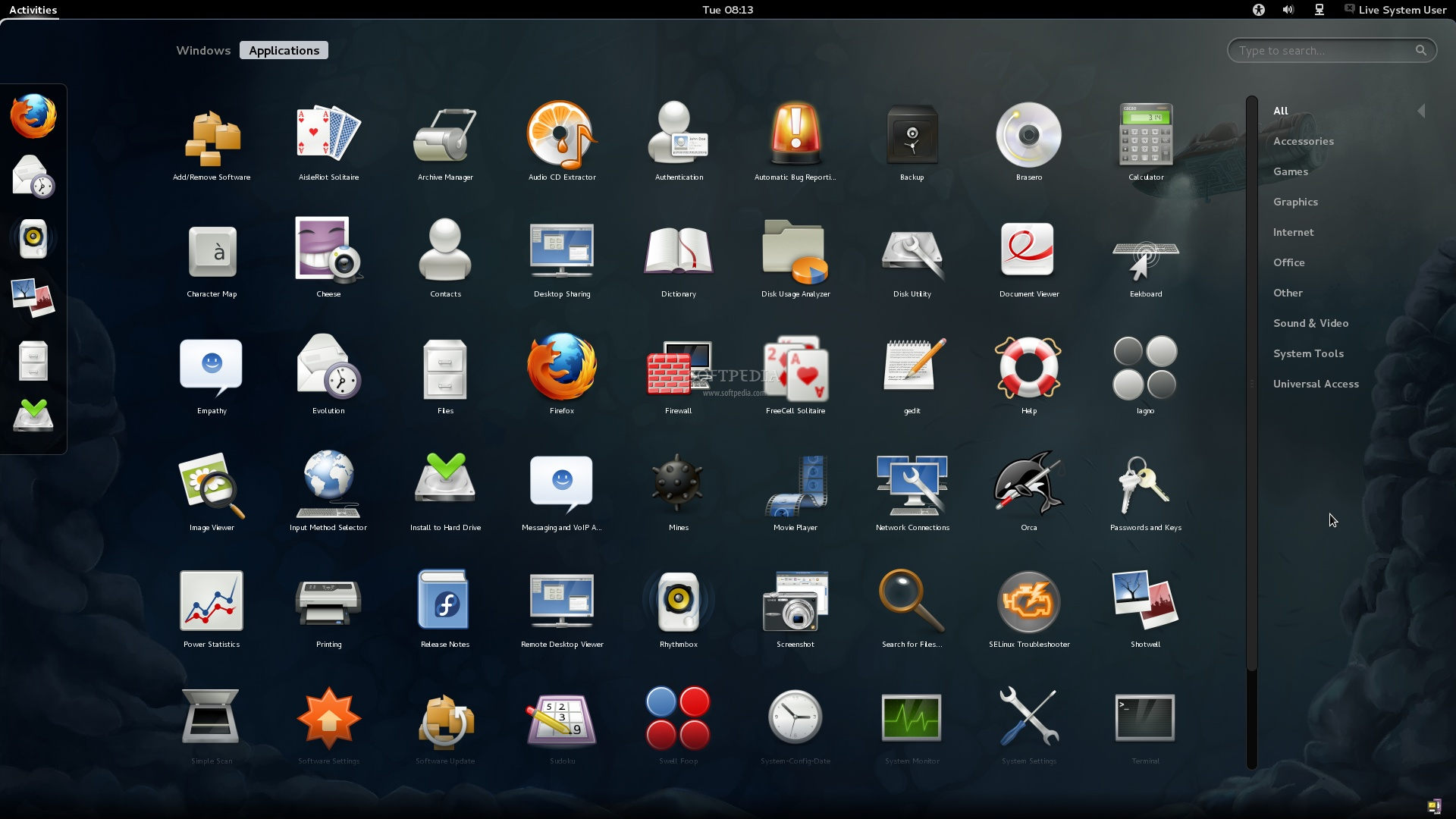Find packages for your operating system:
- Download Fedora 30 Iso
- Fedora Download For Mac Os
- Fedora 30 Download
- Download Fedora For Virtual Machine
- Fedora Download 32
Centos Linux | Debian Linux | Fedora Linux | FreeBSD | HP-UX | NetBSD | OpenBSD | openSUSE | Mac OS X | Red Hat Linux | Solaris | SUSE Linux | Ubuntu Linux | Windows
Fedora Linux for PowerPC Macs. Low End Mac publishes an ongoing series of Compleat Guides to things like Mac OS 9 and different computer lines, but we can't do that with Linux and BSD - they are moving targets. Both families of operating systems are under constant development. All present and past releases can be found in our download area. Installation Notes. For a complete list of system requirements and supported platforms, please consult the User's Guide.
The Apache Subversion project does not officially endorse or maintain any binary packages of the Subversion software. However, volunteers have created binary packages for different distributions and platforms, and as a convenience, we maintain a list of links to them here. If there are any problems with or questions about the different binary packages please send email to the Subversion users mailing list.
Note that binary packages usually come out about a week after the corresponding source release. Please don't post to the mailing lists asking when a binary package for a given platform will be ready. The packagers already know when new source releases come out, and work as fast as they can to make binaries available.
Binaries are typically built from the latest stable release.
Note also that this list does not include distributions of larger collections of software of which Subversion is but one piece. Several vendors offer such things, but we concern ourselves primarily with Subversion itself. As such, the listing here is limited to those packages which may be reasonably considered binary distributions of Apache Subversion alone. If you are looking for more widely scoped, Subversion-related value-add offerings, we trust that ${YOUR_FAVORITE_SEARCH_ENGINE} can facilitate that for you.
Centos Linux ¶
CentOS project (client and server)
CollabNet (supported and certified by CollabNet; requires registration)
WANdisco (supported and certified by WANdisco; requires registration)
Debian Linux ¶
Debian Project (maintained by Debian Project; client and server; svnserve is part of the subversion package, mod_dav_svn is in the separate libapache2-mod-svn package (formerly libapache2-svn))
WANdisco (supported and certified by WANdisco; requires registration)
Fedora Linux ¶
FreeBSD ¶
HP-UX ¶
HP Porting Centre (maintained by Connect Internet Solutions Ltd.)
NetBSD ¶
OpenBSD ¶
OpenBSD Project (client and server; svnserve is part of the subversion package, mod_dav_svn is in the separate ap2-subversion package)
openSUSE ¶
Part of the the standard distribution. svnserve is part of the subversion package, mod_dav_svn is in the separate subversion-server package.
Community packages are available from the openSUSE project, also for the 1.8 series of releases.
Mac OS X ¶
An old version of Subversion is shipped with MacOS X. See the open source section of Apple's web site for more information.
Fink (requires Fink; maintained by Christian Schaffner)
MacPorts (requires MacPorts)
WANdisco (client and server; supported and certified by WANdisco; requires registration)
Red Hat Linux ¶
Red Hat (client and server)
CollabNet (supported and certified by CollabNet; requires registration)
WANdisco (supported and certified by WANdisco; requires registration)
Solaris ¶
WANdisco (supported and certified by WANdisco; requires registration)
SUSE Linux ¶
On SUSE Linux Enterprise: Enable the SDK. svnserve is part of the subversion package, mod_dav_svn is in the separate subversion-server package.
Community packages are available from the openSUSE project, also for the 1.8 series of releases.
WANdisco (supported and certified by WANdisco; requires registration)
Ubuntu Linux ¶
Ubuntu Packages (maintained by Ubuntu Project; client and server; svnserve is part of the subversion package, mod_dav_svn is in the separate libapache2-svn package)
WANdisco (supported and certified by WANdisco; requires registration)
Windows ¶
CollabNet (supported and certified by CollabNet; requires registration)
SlikSVN (32- and 64-bit client MSI; maintained by Bert Huijben, SharpSvn project)
TortoiseSVN (optionally installs 32- and 64-bit command line tools and svnserve; supported and maintained by the TortoiseSVN project)
VisualSVN (32- and 64-bit client and server; supported and maintained by VisualSVN)
WANdisco (32- and 64-bit client and server; supported and certified by WANdisco; requires registration)
Get the latest stable version of Clementine for your operating system.
1.3.1Windows
32-bit

Downloads for other operating systems
1.3.1Debian Jessie
64-bit
1.3.1Debian Jessie
32-bit
1.3.1Raspberry Pi
32-bit
1.3.1Fedora 21
32-bit
1.3.1Fedora 21
64-bit
1.3.1Fedora 22
32-bit
1.3.1Fedora 22
64-bit
1.3.1Fedora 23
32-bit
1.3.1Fedora 23
64-bit
1.3.1Mac
64-bit
1.3.1Source Code
1.3.1Ubuntu Precise
64-bit
Download Fedora 30 Iso

 1.3.1
1.3.1Ubuntu Precise
32-bit
1.3.1Ubuntu Trusty
64-bit
1.3.1Ubuntu Trusty
32-bit
1.3.1Ubuntu Vivid
64-bit
1.3.1Fedora Download For Mac Os
Ubuntu Vivid
Fedora 30 Download
32-bit
1.3.1Ubuntu Wily
64-bit
1.3.1Ubuntu Wily

32-bit
1.3.1Ubuntu Xenial
64-bit
1.3.1Ubuntu Xenial
32-bit
1.3.1Windows
32-bit
Ubuntu PPA
You can download the latest version of Clementine on Ubuntu from the official PPA:
Dependencies for Ubuntu Precise (12.04)
New versions of Clementine require GStreamer 1.0 which wasn't included in Ubuntu 12.04. If you get errors installing Clementine you should add the GStreamer PPA as well:
Clementine Remote for Android
Unofficial packages
If you don't see your distribution listed above then someone else might have created an unofficial package for you.
Compiling from source
Compiling Clementine from source is easy on Linux.Download the source code package from the list above, and in a terminal window:
Download Fedora For Virtual Machine
Bleeding edge packages
Development on Clementine happens inthe git repository.Check out the code by running:
If you'd prefer not to compile the development version yourself then try one of the hourly packages:
There's also an Ubuntu PPA for these development builds:
Fedora Download 32
Notes
Raspberry Pi is a trademark of the Raspberry Pi Foundation